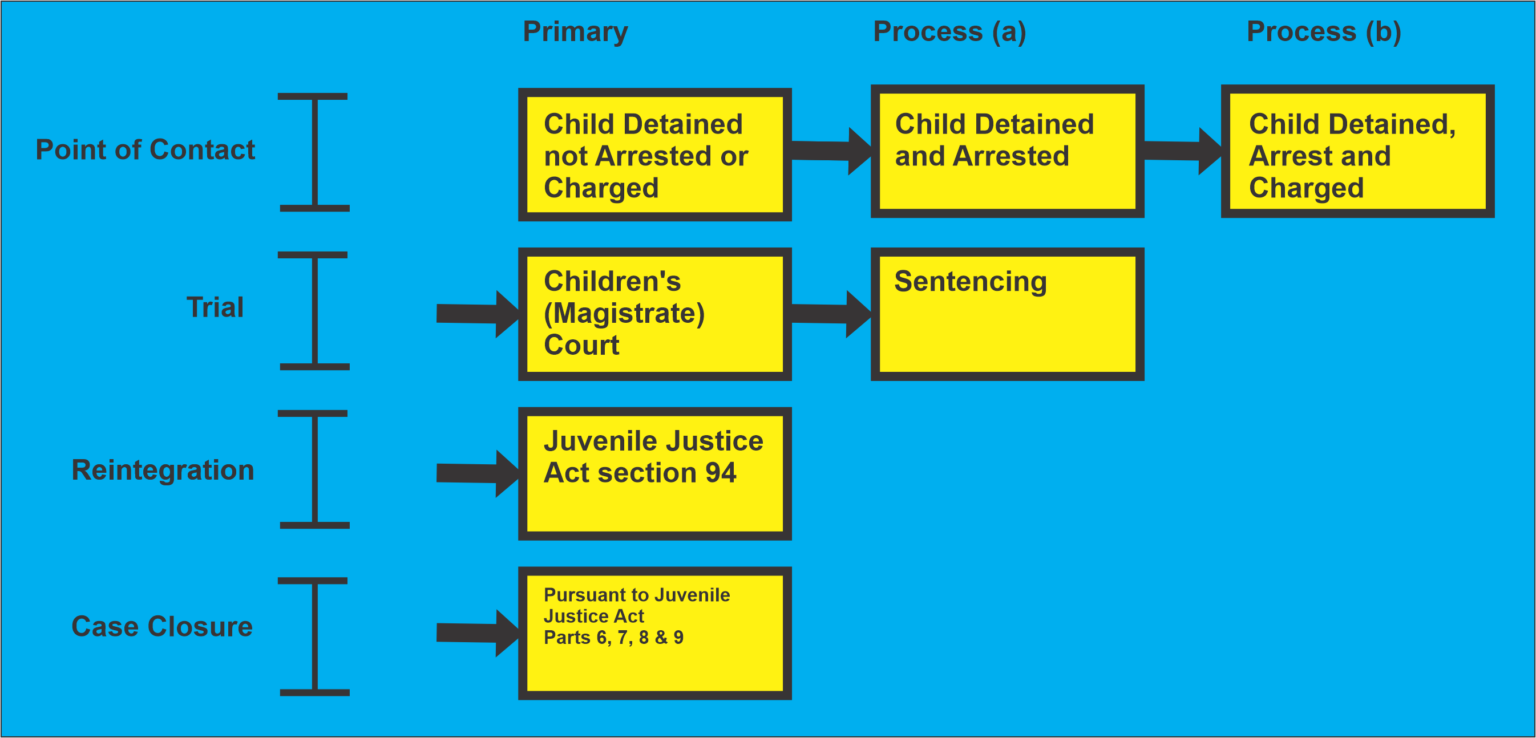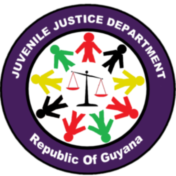Handling Juveniles

Child Detained not Arrested or Charged
Child is detained by Police (GPF).
Child detained by Community Policing Group (CPG).
Child can be detained by Ministry of Education – Schools welfare officer (MoE).
Child can be detained by Ministry of Human Services and Social Security – Childcare and Protection Agency – Child Protection Officer (MoHSSS).
Child can be detained by a Private security Firm then taken to Police Station.
- Private Citizen Arrest then taken to police station.
Child Detained and Arrested
Police must make contact with the child’s parent, legal guardian, Childcare Protection Officer/Social Worker or Attorney-at-Law, right to counsel, Juvenile Justice Act section 20.
Police must obtain proof age of child through Parent or Ministry of Education or Guyana Birth Registration Office, etc. pursuant to Juvenile Justice Act section 120.
Police can divert Child by caution/warn or have the child receive psychosocial counselling through Cops and Faith – a community based organization (CBO) or through any certified program offered by the service provider (NGOs or Constitutional Human Bodies). The certifying body is the Juvenile Justice Committee for all programs within the Juvenile Justice system.
Police can charge the child, only if the child is 14 years old and over.
If the child is under 14 years old and charged with an indictable (schedule offence) offence then, a psychology evaluation must be conducted.
The Juvenile Justice Act 2018 removed all Status Offence; however, children (18 yrs. Old) who are detain for such acts must be reported to the Childcare and Protection Agency (CPA).
Police can send the matter to Mediation, Conferencing or Circle.
Child Detained, Arrested and Charged
Police may detained, arrest and charged a child, given that, the child is 14 years old and over but under 18 years old.
Police along with a Social worker (CPA) must complete a pre-charge screening for the DPP (Juvenile Justice Act section 18).
Ministry of Health (MoH), CPA or MoE should complete a psychological evaluation.
The case file must be review by the DPP’s office.
Child can be diverted providing certain requirements are met.
The Child can be placed on Bail (Station Bail), or be placed on personal recognizance. .
A child can remained at the processing center for up to 48 to 72 hours, without violating the child rights. Depending on the outcome, the child can be taken to Court (Magistrate Court or Mediation) or be diverted. See Juvenile Justice Act section 31.
The Court can grant the Child bail (Court Bail), place the Child in a diversion program or place the juvenile in a temporary holding facility (remand) pursuant to Juvenile Justice Act section 33.
Children’s (Magistrate) Court
A Probation Officer (MoHSSS) must complete a pre-trial report.
Magistrate can place the Juvenile on bail or in custody of a guardian.
Magistrate can place the Juvenile in a diversion program.
Magistrate can place the Juvenile on remand.
Magistrate can send the case to the High Court, given that specifics requirements are express.
Magistrate can send the case to Mediation, Conferencing or Circle.
- Court can request a psychological evaluation and or counseling through MoH, a private psychologist or Psychiatrist.
Court can send.
Sentencing (Magistrate or High Court)
Court can divert a juvenile as part of his sentence. If the juvenile fail to comply, he can be place in an open or close institution.
Court can place a juvenile in diversion; pending completion of the program his sentence can be dismiss.
Court can sentence a juvenile to an open correctional institution.
Court can sentence a juvenile to a close correctional institution.
Court can dismiss the matter altogether.
Court when making a custodial order the court shall specify the level of custody, pursuant to Juvenile Justice Act section 58.
See Juvenile Justice Act section 43 & 44.
Important to note under Juvenile Justice Act section 67, under custodial sentencing, the Court shall review the juvenile sentence.
Juvenile Justice Act section 94
The Juvenile Justice Committee on the recommendation of the Principal of the facility can have the juvenile proceed on reintegration leave from the facility for a period not exceeding 30 days.
The Chief Probation Officer must prepare a reintegration plan. That plan must be shared between the Court and The Juvenile Justice Department – facility’s Principal.
A Probation Officer must prepare a Progress Report during custodial and non-custodial sentence to determine treatment during pre-reintegration.
Pursuant to Juvenile Justice Act Parts 6, 7, 8 & 9
Case closure follows specifics in Part 6, 7 and 8 of the Juvenile Justice Act. However, Part 9 of the Act offers exclusive guidance on the records of Juveniles and disclosure of information.
